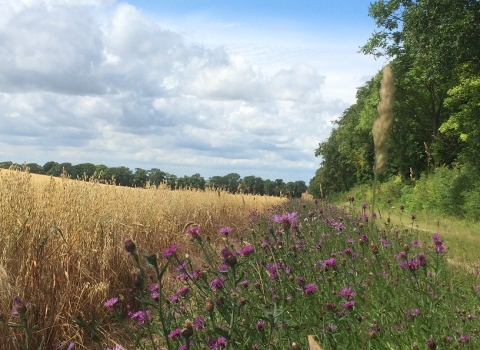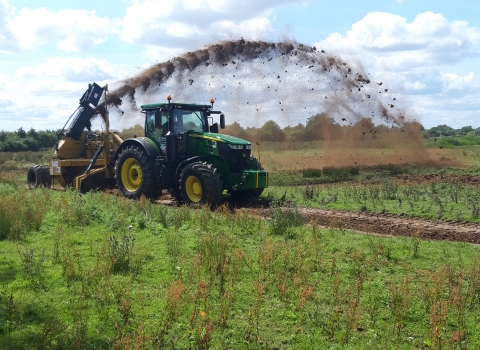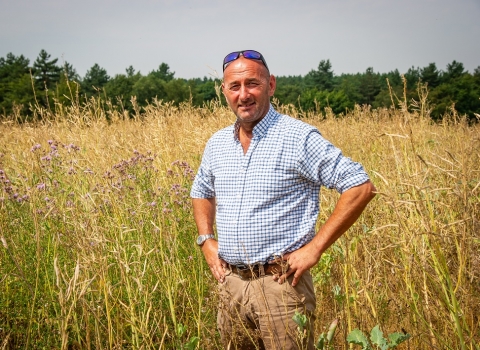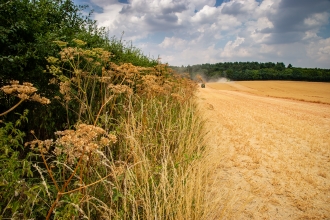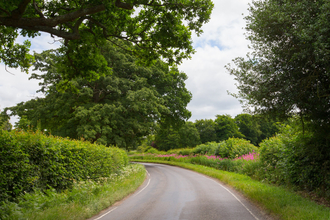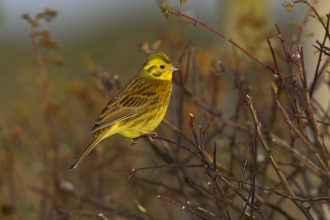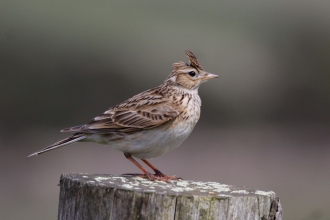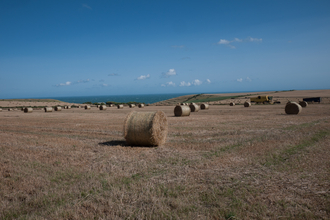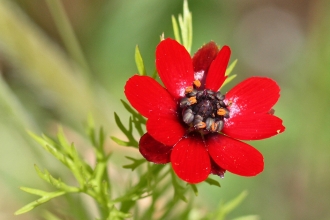Over 70% of the UK’s land is farmed in some way – so how this land is managed has a big impact on wildlife.
A thriving natural environment underpins our ability to grow food into the future, but the decline of wildlife in the countryside threatens this. The recovery of wildlife in the UK depends on a farming policy which enables farmers to create and restore natural habitats alongside food production.
What we do
We advocate for wildlife by working with farmers to advise on best practice, as well as offering partnerships and opportunities across the three counties and feeding in to the national picture.
-
We carry out environmental land management
-
We give advice to farmers and landowners each year
-
We work to improve agriculture policy for wildlife
Advising farmers and land managers
We help wildlife to thrive on farms by providing advice and guidance to landowners. This often involves helping farmers to access grants and can also involve helping groups of farmers to restore and link habitats at a landscape-scale.
Training events for farmers
FWAG East Facilitation Fund
We work with a group of over 20 landowners in the West Cambridgeshire Hundreds Living Landscape. We have recently finished a 3 year Facilitation Fund project with this group where as co-facilitators with Farmers and Wildlife Advisory Group East (FWAG East), we helped to organise and run a number of training events for farmers covering topics including hedgerow, grassland and woodland management, environmental stewardship schemes, and conservation farming techniques.
Farming for the Future
As part of the National Lottery Heritage funded Nenescape project we are working with farmers and landowners in the Nene Valley from Northampton to Peterborough to help restore and create meadow and wetland habitats as well as undertake vital infrastructural improvements to tackle diffuse pollution & aid water quality. Training courses on environmental farm management will be offered to landowners via Moulton College.
Increasing grassland species diversity
We have been involved in trials with FWAG East using mineral blocks impregnated with wildflower seed as a way to help increase species diversity of grassland, working with farmers in the Ouse Valley. The cows eat the seeds along with the mineral block and then do the work of spreading seeds around for us (they have been proven to still be able to germinate after passing through the cows digestive tract).
Local Wildlife Sites
There are around 40,000 Local Wildlife Sites in England covering more than 700,000 hectares of land. Two thirds are in private ownership. Local Wildlife Sites provide refuges for a range of wildlife and act as stepping stones to link nationally important ecological areas. In Bedfordshire, Cambridgeshire and Northamptonshire we have over 1,600 sites.
As Local Wildlife Sites are often privately owned, they rely on the commitment of the landowners, farmers and volunteers who are prepared to carry out sensitive habitat management. Wildlife Trust advisors work with landowners and farmers responsible for Local Wildlife Sites to help them do this. Without such care and effort, a site will gradually decline and lose its diversity and abundance of species. The Wildlife Trusts latest survey (2018) revealed that of more than 6,500 local wildlife sites surveyed nationally, 16% had been damaged or lost over five years, the majority of which relates to poor maintenance.
Water quality
Wildlife Trusts across England are working with water companies to help improve water quality which is impacted by farming. Our Water for Wildlife Officers work with landowners including farmers across all three counties, helping, for example, to consolidate river banks where livestock go to drink in order to limit erosion such as at Harrold-Odell Country Park in Bedfordshire.
Trials and innovation
Water Works
From April 2019 - April 2021, the Wildlife Trust BCN will create field scale trials of wet farming at the Great Fen in Cambridgeshire to test innovative new crops for food, healthcare and industry, and to lock in carbon. A large part of the project will be working with local farmers, food producers and landowners to create and test this new way of farming and to share lessons learned along the way.
The project is managed by a partnership between the Wildlife Trust Bedfordshire, Cambridgeshire and Northamptonshire; Cambridgeshire ACRE, The Centre for Ecology and Hydrology and the University of East London and is funded by a grant awarded in 2019 by the People’s Postcode Lottery Dream Fund: a grant-giving charity funded entirely by players of People’s Postcode Lottery.
Great Fen Water Works plot, aerial by Henry Stanier
ELM Test and Trial
The Wildlife Trust BCN has secured funding to be part of the government's Environmental Land Management (ELM) test and trial scheme. We are working with Natural Capital Solutions and land managers in the Upper Nene Valley to trial how habitat opportunity mapping can help prioritise, safeguard and link-up habitats on and across landholdings. The research will be used to help shape the new policy aiming to deliver ‘public money for public goods’ across Britain as part of the new Agriculture Act.
Managing our own land
On our nature reserves we practice sustainable environmental land management using techniques such as conservation grazing. The Wildlife Trust BCN owns hundreds of grazing animals, including traditional and rare breed sheep and cattle. We also use local farmers to help manage wildlife sites. Grazing is the most natural form of management for certain habitats. Livestock can access areas that machinery can’t, and the impacts of grazing are slower than other methods, such as burning or cutting, which means that less-mobile wildlife can thrive.
The Agriculture Act
The new Agriculture Act was given Royal assent in November 2020. The fundamental principle of the bill is that public money should pay farmers to deliver public goods - a welcome shift in how farmers are supported, and one welcomed with almost unanimous support from farming unions to environmental charities.
It is now important to hold government to account and make sure that this new legislation and guidance is implemented. The Wildlife Trusts, along with our partners via Greener UK and the Wildlife and Countryside Link, will continue to do so.
Agriculture policy - our proposals for the future
Agriculture policy shapes our countryside. For decades this has often been at the expense of wildlife and natural habitats, and The Wildlife Trusts nationally have worked with farmers and government to change this.
With the UK’s exit from the European Union drawing closer the UK has a rare chance to design a new farming policy – for the first time in decades.
We should invest in the restoration of our land and wildlife so that it can continue to provide us with all the things we need: sustainable and nutritious food, wildlife habitats, flood and drought management, clean water and air, carbon storage and places for us to enjoy.
We think a future farming policy should be based on rewarding farmers and land managers for delivering benefits they can’t sell but that society needs. These benefits (or ‘public goods’) include maintaining important habitats like woodlands and grasslands and helping reduce the risk of flooding by holding back or storing floodwater – also called natural flood management.
You can read our proposals for a future sustainable farming and land management policy in England online. We suggest that in a future scheme, farmers and land managers should be paid to provide eight benefits to the public – including healthy soils, abundant pollinators, thriving wildlife and clean water. Yorkshire Wildlife Trust have analysed how such a policy could be applied in practice in the River Aire catchment in Yorkshire and we worked with the RSPB and The National Trust to estimate how much funding environmental land management needs in future.
We also work in coalition with other organisations, for instance through Greener UK - a new coalition of charities which formed to work together for wildlife, post-Brexit, and Wildlife & Countryside Link. The WIldlife Trusts published a policy document on agricultural policy post Brexit which was contributed to as a part of Wildlife & Countryside Link.
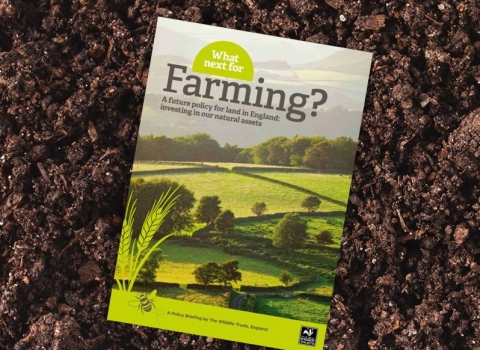
What next for farming?
Read our recommendations for a future agriculture policy after the UK leaves the EU. Published in January 2018.

